On February 9th Israel’s Prime Minister’s Office put out a statement:
“It is impossible to achieve the goal of the war of eliminating Hamas by leaving four Hamas battalions in Rafah.
On the contrary, it is clear that intense activity in Rafah requires that civilians evacuate the areas of combat.
Therefore, Prime Minister Benjamin Netanyahu has ordered the IDF and the security establishment to submit to the Cabinet a combined plan for evacuating the population and destroying the battalions.”
In addition to those four remaining Hamas battalions in Rafah (out of 24), it is assessed that some of the Israeli hostages are being held in that city – as was the case with two who were rescued last month – and that some of the Hamas leadership is hiding there.
The strategic importance of Rafah also includes an additional factor, described as follows by Lazar Berman at the Times of Israel:
“Palestinians began digging tunnels under Israel’s border fences during the First Intifada in the late 1980s, and in the ensuing decades, the Israel Defense Forces tried a range of methods to uncover the tunnels and keep terrorist groups from bringing in deadly new weapons.
The focus was on the Philadelphi Route, the 14-kilometer security road dividing the Gazan and Egyptian sections of Rafah. But it was perilous work. During the Second Intifada, the corridor is where 13 IDF soldiers were killed in the 2004 APC Disaster, and Hamas managed to detonate explosives under the JVT outpost, killing five soldiers.
Over the objections of Israel’s security services and many officials, Israel withdrew from the Philadelphi Route in the 2005 withdrawal from Gaza. Israel allowed Egypt to introduce 750 heavily armed border guards, but they failed to prevent a massive increase in smuggling into the Strip.
When Hamas forcibly ejected the Palestinian Authority from Gaza in 2007, they used the tunnels — and occasional destruction of the Egypt border fence — to fill their coffers, and to build up their military capabilities. […]
It is hard to imagine Israel meeting its war aim of toppling Hamas if it doesn’t take Rafah. Most of the remaining functioning Hamas battalions are in the city, and if Israel doesn’t take control of the border area, the Gaza-ruling terror organization can resume smuggling new weapons in — and potentially hostages or senior leaders out — when the fighting ends.”
As urban warfare expert John Spencer and Dr Jacob Stoil put it:
“Without the realistic threat of an Israeli operation in Rafah, Hamas has no reason to seek a ceasefire, and given Hamas’ strategy, there can be no truly lasting ceasefire if Hamas can return to control Gaza.”
February 9th also saw the beginning of copious BBC coverage of a possible Israeli military operation in Rafah, focusing audience attentions (including by means of the chosen images) mostly on the topic of the civilian population there, which includes large numbers of evacuees from other parts of the Gaza Strip. But what did the BBC tell its audiences about the reasons why Israel considers an operation in Rafah to be necessary?
Below are the reasons presented – or not – in twenty-eight items published on the BBC News website in the 44 days between February 9th and March 23rd. [emphasis added]
1) “Israel-Gaza war: Palestinians who fled to Rafah fear Israeli assault” 9/2/24, uncredited.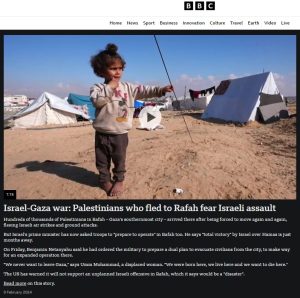
“Hundreds of thousands of Palestinians in Rafah – Gaza’s southernmost city – arrived there after being forced to move again and again, fleeing Israeli air strikes and ground attacks.
But Israel’s prime minister has now asked troops to “prepare to operate” in Rafah too. He says “total victory” by Israel over Hamas is just months away.
On Friday, Benjamin Netanyahu said he had ordered the military to prepare a dual plan to evacuate civilians from the city, to make way for an expanded operation there.
“We never want to leave Gaza,” says Umm Mohammad, a displaced woman. “We were born here, we live here and we want to die here.”
The US has warned it will not support an unplanned Israeli offensive in Rafah, which it says would be a “disaster”.”
2) “Israel-Gaza war: US says it will not back unplanned Rafah offensive” 9/2/24, by Tom Bateman, Kathryn Armstrong and Patrick Jackson.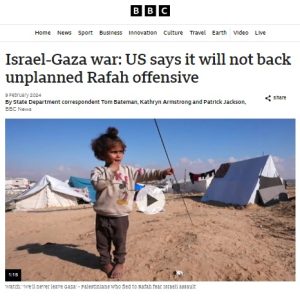
“The comments come days after Israel’s leader said the military had been told to prepare to operate in Rafah. […]
On Tuesday, Israeli Prime Minister Benjamin Netanyahu said he had ordered troops to “prepare to operate” in Rafah and that “total victory” by Israel over Hamas was just months away.”
3) “Netanyahu orders military to plan evacuations from Rafah” 10/2/24, by Marita Moloney.
“Israeli Prime Minister Benjamin Netanyahu has ordered the military to prepare to evacuate civilians from the southern Gazan city of Rafah ahead of an expanded offensive against Hamas. […]
Mr Netanyahu told military and security officials to “submit to the cabinet a combined plan for evacuating the population and destroying the battalions” of Hamas, his office said on Friday.
“It is impossible to achieve the goal of the war without eliminating Hamas, and by leaving four Hamas battalions in Rafah. On the contrary, it is clear that intense activity in Rafah requires that civilians evacuate the areas of combat,” the statement added.
Earlier this week, Mr Netanyahu said he had ordered troops to “prepare to operate” in Rafah and that “total victory” by Israel over Hamas was just months away.”
4) “Netanyahu insists on Rafah offensive as warnings mount” 11/2/24, uncredited.
“Prime Minister Benjamin Netanyahu said the Israeli military will go ahead with its planned ground offensive, insisting an evacuation plan is being prepared. […]
Saturday’s warnings came a day after Israeli Prime Minister Benjamin Netanyahu ordered his military to prepare to evacuate civilians from the city ahead of an expanded offensive against Hamas. […]
In an interview with US broadcaster ABC News aired on Sunday, Mr Netanyahu said “victory is in reach” and the Israeli military were “going to get the remaining Hamas terrorist battalions in Rafah”.
He also said Israel would “provide safe passage” for civilians in the southern city.
When pressed about where they should go, Mr Netanyahu suggested there were “plenty” of areas “that we’ve cleared north of Rafah” and insisted officials were “working out a detailed plan”.
“Those who say that under no circumstances should we enter Rafah are basically saying, ‘Lose the war. Keep Hamas there,'” he added.”
5) “Israel-Gaza war: Death and Israel’s search for ‘total victory’” 11/2/24, by Jeremy Bowen.
“Air strikes already kill many people in Rafah, but despite American calls for restraint, Israel’s Prime Minister Benjamin Netanyahu says he has ordered the army to attack the town once it has a plan to move Palestinian civilians out of Rafah. Since nowhere in Gaza is safe, residents do not find that reassuring. Perhaps Mr Netanyahu is trying to mollify Mr Biden.”
6) “Israel Gaza: Palestinians sheltering in Rafah fear impending offensive” 12/2/24, by Adam Durbin and Alys Davies.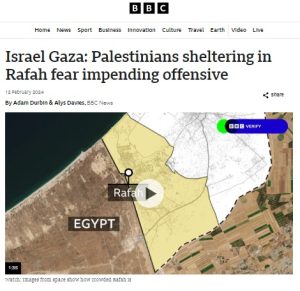
“Last week, Israel’s Prime Minister Benjamin Netanyahu announced he had ordered troops to prepare to expand its ground operation to Rafah. […]
In an interview with ABC News on Sunday, Mr Netanyahu said Israel was “working out a detailed plan” to move civilians to areas north of the city.
“Victory is within reach,” he said. “Those who say that under no circumstances should we enter Rafah are basically saying, ‘lose the war, keep Hamas there.'””
7) “Israel-Gaza war: ‘Violent’ strikes reported in Gazan city of Rafah” 12/2/24, by Adam Durbin.
“Mr Netanyahu has insisted it will go ahead and a plan is being prepared. […]
The warnings about an escalation of fighting in Rafah came after Mr Netanyahu ordered his military to prepare to evacuate civilians from the city ahead of an expanded offensive against Hamas. […]
In an interview with US broadcaster ABC News aired on Sunday, the Israeli PM said “victory is in reach” and the Israeli military were “going to get the remaining Hamas terrorist battalions in Rafah”.
He also said Israel would “provide safe passage” for civilians in the southern city.
When pressed about where they should go, Mr Netanyahu suggested there were “plenty” of areas “that we’ve cleared north of Rafah” and insisted officials were “working out a detailed plan”.
“Those who say that under no circumstances should we enter Rafah are basically saying, ‘Lose the war. Keep Hamas there,'” he added.”
8) “Bowen: Gazans fled to Rafah for safety but now Israel wants to attack” 12/2/24, by Jeremy Bowen.
Synopsis: “More than a million displaced Palestinians have found shelter in the south of the Gaza strip after fleeing the fighting in the north.
Now Israel says it will expand its military operations all the way to the south – with heavy aerial bombardment reported in the Gaza area.
A ground invasion in the refugee-packed area could prove disastrous and the US has warned Israel not to attack without a “credible” plan to protect civilians.
International journalists are not allowed in Gaza. Our International editor Jeremy Bowen reports from the wall separating Bethlehem in the West Bank from Israeli-controlled Jerusalem.”
Bowen: “The Israelis say moving in on Rafah is a military necessity in pursuit of what the prime minister calls total victory against Hamas. They want to get into those tunnels. And as well as that, they want to get more than 100 Israeli hostages back.”
9) “Israel’s assault on Rafah looms, but no plan yet to evacuate civilians” 12/2/24, Paul Adams.
“Israel says that of Hamas’ six remaining battalions, four are in Rafah. It’s possible that some of the group’s main leaders are also there – although the existence of tunnels from Rafah into Egypt also means that some may have escaped the Gaza Strip.”
10) “Israel Gaza: Biden says Israel must protect vulnerable in Rafah” 13/2/24, uncredited.
“Last week, Israel’s Prime Minister Benjamin Netanyahu announced that he had ordered troops to prepare to expand its ground operation to Rafah. He vowed to defeat Hamas gunmen hiding in the city.”
11) “Israel Gaza: Ceasefire talks resume as Rafah under fire” 13/2/24, uncredited.
“He [Netanyahu] later ordered Israeli troops to prepare to expand their ground operation, and vowed to defeat Hamas gunmen hiding in Rafah.”
12) “Israel Gaza: UN warns of ‘slaughter’ if Israel launches ground assault on Rafah” 14/2/24, by Ido Vock & Jacqueline Howard.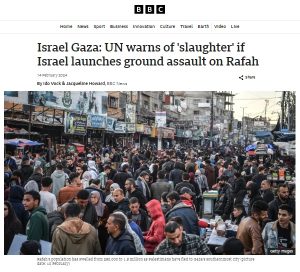
“Israeli Prime Minister Benjamin Netanyahu has vowed to defeat Hamas gunmen he says are hiding in the city.”
13) “Israel Gaza: Netanyahu vows to press ahead with Rafah offensive” 15/2/24, by Jacqueline Howard.
Israeli Prime Minister Benjamin Netanyahu has insisted his troops will advance on the Gazan city of Rafah, defying outside pleas to reconsider. […]
But Mr Netanyahu has ordered his army to prepare for a ground assault. […]
Mr Netanyahu vowed to press on with a “powerful” assault, declaring that Hamas, the group which controls Gaza, must be eliminated from the southern city.”
14) “Israel Gaza war: Satellite images show construction on Egypt’s border” 16/2/24, by Alys Davies and Paul Adams. Discussed here.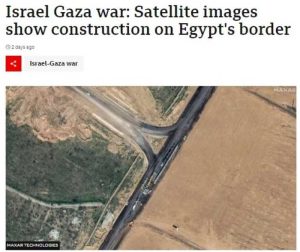
“Israeli Prime Minister Benjamin Netanyahu appears set on a major offensive in Rafah – where some 1.4 million people are sheltering – despite a chorus of international warnings.
Israel claims Hamas forces are in the city and must be “eliminated”. It also believes Israeli hostages – of which 130 are still unaccounted for – are being held there.”
15) “Israel-Gaza war: Latest ceasefire talks not very promising – Qatar” 18/2/24, by James Gregory.
“It comes as Israel’s prime minister said he would press ahead with plans for a Rafah ground invasion, despite growing international pressure. […]
Speaking in Jerusalem on Saturday, Mr Netanyahu reiterated his aims of destroying Hamas and said his forces would fight until Israel achieved “total victory”.
He said those urging against military action in Rafah, the southern-most Gazan city where some 1.5 million people have fled, were effectively telling the country to “lose the war”, adding that his troops would enter even if a hostage deal was reached.”
16) “Israel indicates March deadline for Gaza ground offensive in Rafah” 19/2/24, uncredited.
“Israeli war cabinet member Benny Gantz has warned that unless Hamas frees all hostages held in Gaza by 10 March an offensive will be launched in Rafah. […]
Speaking on Sunday, Mr Gantz, a former defence minister, said: “The world must know, and Hamas leaders must know – if by Ramadan our hostages are not home, the fighting will continue everywhere, to include the Rafah area”. […]
Despite international pressure, Israeli Prime Minister Benjamin Netanyahu has vowed to launch a ground assault on Rafah to eliminate Hamas gunmen there.”
17) “Israel’s Rafah deadline raises stakes as Ramadan approaches” 19/2/24, by Lyse Doucet.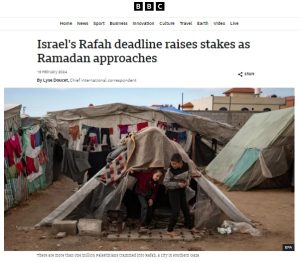
“In the midst of Israeli declarations it must send its troops into Rafah to complete its operation to “destroy Hamas”, Egypt has been strengthening defences along its border, including the construction of a walled enclosure. Satellite images showing an area of roughly eight square miles fenced by seven-metre high walls have provoked speculation that Cairo is preparing for a worst case scenario – that thousands of Palestinians will have nowhere else to seek refuge except across the border.”
18) “Israel Gaza: Biden hopes for ceasefire by next week” 27/2/24, uncredited.
“Mr Netanyahu said in an interview with CBS on Sunday that Israeli forces would eventually launch an invasion of Rafah regardless of any agreement for a temporary ceasefire, insisting: “We can’t leave the last Hamas stronghold without taking care of it.”
“If we have a deal, it’ll be delayed somewhat,” he added. “But it’ll happen. If we don’t have a deal, we’ll do it anyway.””
19) “Hamas delegation leaves Gaza truce talks in Cairo without deal” 7/3/24, by Yolande Knell and David Gritten.
“He [Netanyahu] also reiterated that troops would eventually launch an assault on the southern city of Rafah, where an estimated 1.4 million displaced Palestinians are sheltering.
“Whoever tells us not to act in Rafah is telling us to lose the war and that will not happen,” Mr Netanyahu said, describing the city as “Hamas’s last stronghold”.”
20) “Netanyahu is a survivor, but his problems are stacking up” 9/3/24, Wyre Davies.
“He [Netanyahu] reiterated that troops would eventually launch an assault on the southern city of Rafah, where an estimated 1.4 million displaced Palestinians are sheltering. […]
A belligerent Mr Netanyahu told a military graduation ceremony this week that that the military “will continue to operate against all of Hamas’s battalions“.”
21) “Biden and Netanyahu’s deepening rift on public display” 12/3/24, by Tom Bateman.
“Mr Netanyahu responded during his interview on Sunday, vowing to press ahead into Rafah: “We’ll go there. We’re not going to leave [Hamas]. You know, I have a red line. You know what the red line is? That October 7 doesn’t happen again. Never happens again.””
22) “Israel says it plans ‘humanitarian islands’ for Gaza displaced” 14/3/24, by Anna Foster.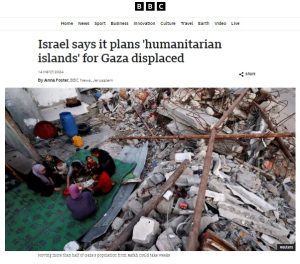
“Israel has repeatedly signalled its need for such an operation, insisting Hamas cannot be fully removed in Gaza without targeting Rafah.
It is conscious, too, that the group’s most senior leaders are still at large, almost certainly now in the southernmost part of the strip. […]
Benny Gantz, a member of Israel’s war cabinet, had suggested a new military operation would begin in Rafah by the start of the Islamic holy month Ramadan if no new hostage release deal was agreed.
That did not happen, but Prime Minister Benjamin Netanyahu continues to reference it when he addresses the Israeli people.
“There is international pressure to prevent us from entering Rafah and completing the work. As prime minister of Israel, I reject this pressure,” Mr Netanyahu told soldiers at Ofer military base on Thursday.
“We will enter Rafah. We will complete the elimination of Hamas’s battalions. We will restore security and we will bring total victory for the people of Israel and State of Israel,” he added.”
23) “Israel downplays truce prospects after Hamas response” 15/3/24, uncredited.
“He [Netanyahu] also approved plans for a military operation in the southern Gaza city of Rafah, where more than a million people from other parts of Gaza are sheltering.
The army was preparing for the evacuation of civilians, he said. On Thursday the IDF said it planned to move displaced Palestinians in Gaza to what it called “humanitarian islands” in the middle of the strip.
It is not clear what the “islands” will look like, or how they will operate. But the military suggested that aid and temporary housing would be provided. No timeframe has yet been given about when the operation could happen.
The UN and US have warned that a full-scale assault in Rafah could be disastrous but Israel has repeatedly signalled its need for such an operation, insisting Hamas cannot be fully removed in Gaza without targeting Rafah.”
24) “Israel-Gaza war: Netanyahu vows to defy allies on Rafah invasion” 17/3/24, by Nathan Williams and Mark Lowen.
“Israel’s Prime Minister Benjamin Netanyahu has reaffirmed his determination to launch an offensive in Rafah, defying international criticism. […]
He said Israel must be able to continue its war, with the aims of eliminating Hamas, releasing all hostages and ensuring Gaza “no longer poses a threat”.
“To do this, we will also operate in Rafah.” […]
…Mr Netanyahu said: “[Israel’s] goal in eliminating the remaining terrorist battalions in Rafah goes hand in hand with enabling the civilian population to leave Rafah”.
“It’s not something that we will do, while keeping the population locked in place,” the Israeli leader added.”
25) “Blinken visits Middle East to discuss Gaza post-war plan” 20/3/24, by Tom Bateman and Rushdi Abu Alouf.
“Mr Blinken will also travel to Israel on Friday as part of his current trip. According to Mr Miller, he will discuss with Israeli leaders the hostage negotiations and the “need to ensure the defeat of Hamas, including in Rafah, in a way that protects the civilian population”.
President Joe Biden has warned Israel that it would be a “mistake” to launch an offensive in the southern city of Rafah, where more than a million displaced civilians are sheltering.
But on Tuesday, Mr Netanyahu said Israel was “determined to complete the elimination of [the Hamas] battalions in Rafah, and there is no way to do this without a ground incursion”.”
26) “US call at UN for Gaza truce linked to hostages blocked” 22/3/24, by Raffi Berg.
“Israel’s Prime Minister, Benjamin Netanyahu, has said that Israel will go ahead with a planned ground assault on Rafah, even without the support of its key ally.”
27) “Gaza war: How the crisis is testing the limits of US diplomacy” 23/3/24, by Tom Bateman.
“Speaking at Ben Gurion airport on Friday afternoon, Mr Blinken castigated those who voted it down. He implied they did so for reasons that had nothing to do with the substance, while also warning that a Rafah offensive could leave Israel without international support.
“It risks killing more civilians, it risks wreaking greater havoc with the provision of humanitarian assistance, it risks further isolating Israel around the world and jeopardising its long term security and standing,” he said.
Amid the growing rift between Washington and the Israeli leader, Mr Netanyahu struck back at Mr Blinken’s assessment.
“I told him I hope we’ll do it with the support of the United States,” said the prime minister, “but if we have to, we’ll do it alone”.”
28) “Israel-Gaza war: UN Secretary General Antonio Guterres in new ceasefire call” 23/3/24, by Ece Goksedef.
“His trip comes as Israel plans to launch a ground operation in Rafah. More than half of Gaza’s 2.3 million Palestinians are sheltering in the southern city, where Israel says Hamas leaders are hiding and Hamas battalions still operate.
Israel’s Prime Minister Benjamin Netanyahu has defied international criticism of the planned offensive, saying “no international pressure will stop Israel” from achieving all of its war aims.”
In summary, nine of those 28 items mention “Hamas battalions” while four others use the more tepid terminology “Hamas gunmen” or “Hamas forces”. Only three of the items refer to Hamas leaders and just three make any mention of the hostages. Only two of the items include any reference to tunnels, but without any explanation of their significance.
Most of the background given come in the form of quotes from Israeli officials – overwhelmingly the prime minister. In other words, in forty-four days of covering a story that has yet to happen, the BBC has failed to provide its audiences even once with a fact-based, objective explanation in its own words as to why a military operation in Rafah is considered necessary.
Related Articles:

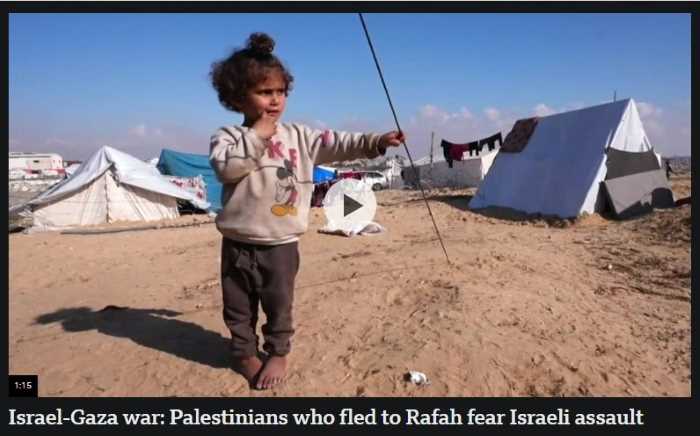

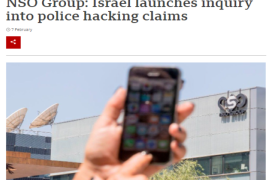
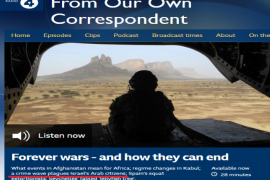

The UK having friends like the IPC (aka BBC) to help defeat proscribed terrorist organisations such as Hamas, it certainly does not need enemies. The BBC should be designated as a traitorous organisation deeply involved with helping Britain’s enemies.